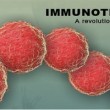Dr. Mary “Nora” Disis, a national leader in cancer-vaccine research, said her area of expertise is also making major strides within the field of immunotherapy. She points to this past year as a sure sign of progress, when three advanced clinical studies showed the benefits of vaccination in patients with prostate cancer, follicular lymphoma and melanoma.
Colon Cancer Vaccine
Dr Nora Disis
“When people ask why it’s taking so long to come up with effective therapies, I’d say “we’re here, this is it” Disis said. Vaccines have already shown great promise in preventing certain cancers from developing in healthy people. One example is the groundbreaking human papillomavirus vaccine against cervical cancer, which was developed in part through research from the Hutchinson Center. Now vaccines ask why based on immunotherapy have the potential to stop the recurrence of cancer for many types of solid tumors—and with tolerable or no side effects.

Traditional immunizations work by helping the immune system develop resistance to a weakened or dead form of a microbe. Then, if there’s contact with the live germ or virus, the immune system knows how to fight it off. But cancer cells often don’t induce a strong response from the immune system.
Disis and others are working to change that picture.
A focus of their work is therapeutic vaccination, which is designed to treat an illness after it has been acquired. That’s an important distinction for cancer patients. The goal of a therapeutic vaccine is to provoke a stronger and faster response from the immune system to prevent the recurrence of cancer.
Such a vaccine would be a lifesaver for women diagnosed with invasive breast cancer and ovarian cancers, which have high recurrence rates. About 30 percent of women diagnosed with invasive breast cancer will have recurrences within five years, and 80 percent of women treated for ovarian cancer relapse after the first treatment.
Therapeutic cancer vaccines also may increase survival times, delay the spread of the cancer, and help to maintain or improve patients’ quality of life.
Disis has focused her work on patients whose tumors have responded well to surgery and therapies but whose chances of recurrence are high. One of her trial vaccines stimulates the patients’ disease-fighting response by targeting a protein called H2N, which is found in higher levels in some breast and ovarian cancer cells.
“Our goal is to create a vaccine that will activate immunity to very high levels very rapidly against the H2N protein,” Disis said. Results have been promising. In early clinical studies of patients with metastatic breast cancer, 40 percent were still alive nine years after vaccination.
More links on this subject:
Modified Smallpox Vaccine Targets Cancer Cells While Missing Healthy Ones:
Is there a cancer vaccine?
Cuba’s Lung Cancer Vaccine Could Save Your Life:




Speak Your Mind